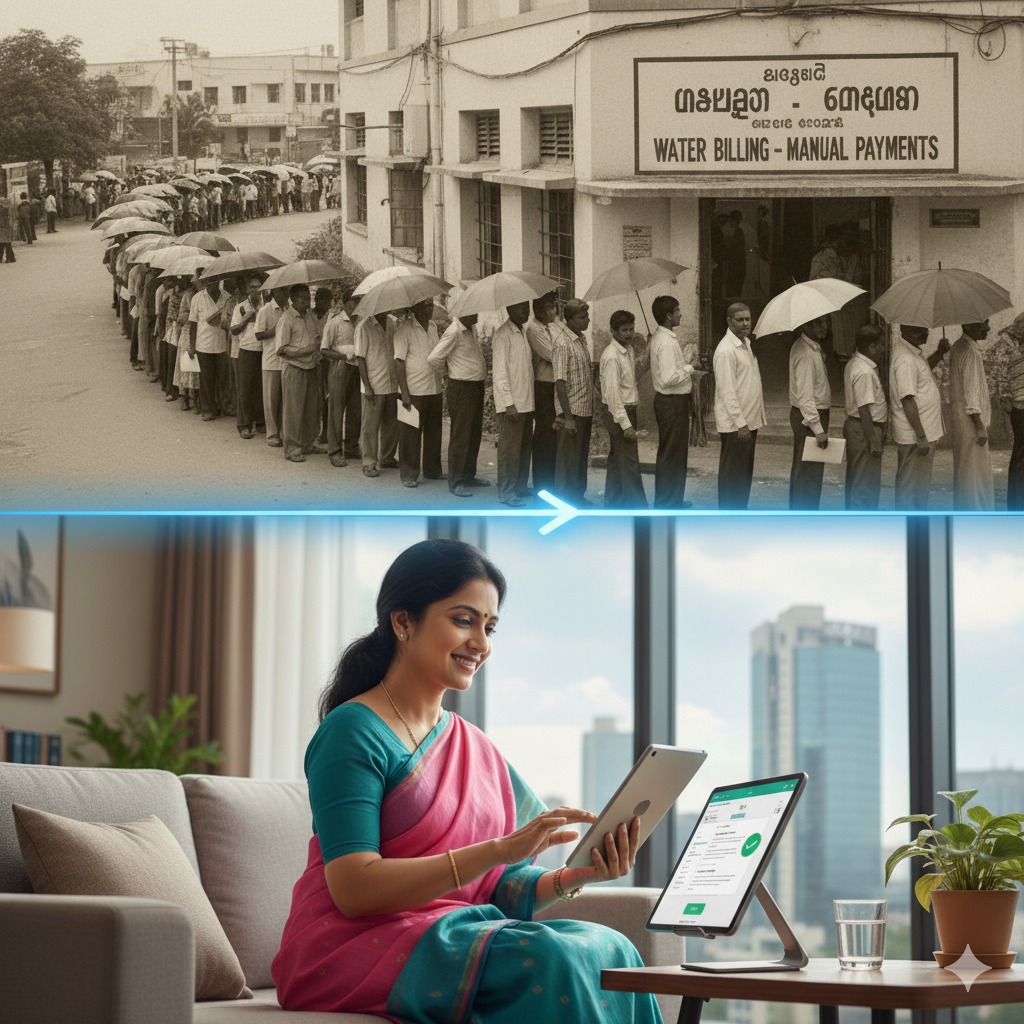How Manipur Turned Water Billing Into a Blueprint for Trust
- News & Events

How Manipur Turned Water Billing Into a Blueprint for Trust
Public utilities rarely make headlines. They exist in the background – necessary, unnoticed, often frustrating. Water billing is a perfect example: essential to every household, but chronically inefficient, plagued by long queues, manual paperwork, and the quiet resignation of citizens who accept that this is simply how things work.
But every now and then, a small shift in this hidden infrastructure reveals something larger. It shows us what governance could look like if the relationship between citizen and state were redesigned for simplicity, transparency, and trust.
That’s exactly what happened in Manipur on August 26, 2025, when the Public Health & Engineering Department (PHED), in partnership with Auriga IT, launched the state’s first online water billing portal
It might sound unremarkable- a portal, a payment system, an interface. But when you look closely, it’s a case study in how digital public services, if executed well, can change the texture of daily life.
The Quiet Friction of Public Utilities
We often underestimate the cost of inefficiency. When paying a bill requires half a day of waiting, citizens lose not only their time but also their confidence. Friction becomes more than inconvenience; it becomes a signal that the system is indifferent.
This was the baseline in Manipur. The task of water billing- as simple in concept as handing over money for usage- was stretched into an exercise of patience and bureaucracy. And yet, this story isn’t unique. Across India, millions of people experience the same friction for electricity, transport, and municipal services.
The deeper challenge isn’t about payments. It’s about trust. When citizens perceive government systems as slow, opaque, and inefficient, it quietly erodes their belief in governance itself.
What Auriga IT and PHED Built
The water billing portal looks straightforward on the surface. But underneath, it’s a carefully orchestrated system:
- Meter-to-bill accuracy: 50,498 meters feeding reliable consumption data.
- Scalable backend: Java and Spring Boot, designed to grow as adoption scales.
- Cloud infrastructure: AWS EC2, SQS, SES – ensuring uptime, speed, and secure notifications.
- User-first design: Payments, applications, complaints, and updates – all handled in a single, intuitive interface.
The goal wasn’t technology for technology’s sake. It was to engineer away the friction that undermined trust.
Proof That Adoption Follows Simplicity
Within weeks of trialing the system across Imphal:
- ₹91 lakh collected digitally.
- Tens of thousands of households onboarded.
- Complaints tracked and resolved in real time.
These aren’t vanity metrics. They’re signals. They show that when you respect people’s time, they respond with trust and adoption.
The Second-Order Effects
At first glance, this is just a billing portal. Look deeper, and it’s a blueprint for a new kind of public service:
- Digital normalcy for essentials: Paying a water bill online sets the stage for citizens to expect the same convenience across all utilities.
- Data-driven governance: Reliable consumption data enables smarter tariff models, leak detection, and conservation planning.
- Operational efficiency: Automating bill generation and collection frees manpower for maintenance and service delivery.
- Trust as infrastructure: Transparency in billing strengthens the citizen–government relationship.
In other words, the portal isn’t about transactions. It’s about re-engineering the social contract around public utilities.
A Model for the Future
If you zoom out, you see how this fits into a broader arc. Across the world, governments are wrestling with the challenge of digitalization. Some overreach, layering ambitious dashboards and AI systems onto fragile infrastructure. Others move too slowly, leaving citizens to navigate outdated manual processes.
Manipur offers a different lesson: start with a single, essential service. Execute it well. Build on it.
The PHED has already signaled the next steps: expanding coverage, introducing consumption-based tariffs, and using portal data for smarter infrastructure planning. Each of these builds on the foundation of trust created by making the initial experience seamless.
This isn’t just good technology. It’s good governance.
The Takeaway
Digital public services don’t have to be complicated to be transformative. They don’t need to shout about blockchain, AI, or predictive analytics. They need to respect citizens’ time, deliver reliability, and create trust.
Manipur’s online water billing portal shows what happens when public leadership and private execution align around those principles. It turns an invisible act- paying for water- into proof that change can be immediate, measurable, and meaningful.
For most of us, it’s easy to overlook something as mundane as water billing. But sometimes, the smallest, quietest shifts are the ones that tell the biggest stories about the future.
Related content
Auriga: Leveling Up for Enterprise Growth!
Auriga’s journey began in 2010 crafting products for India’s
